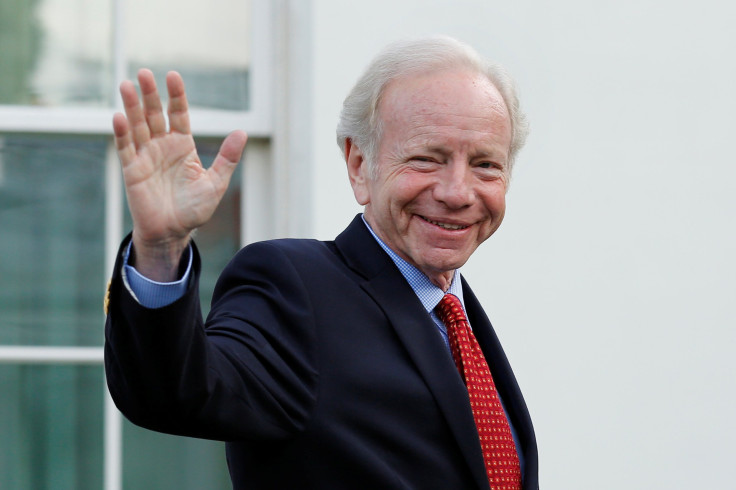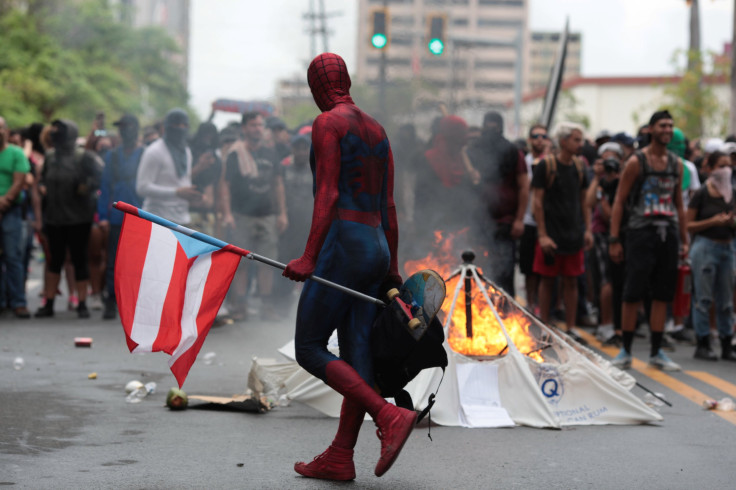Joe Lieberman Had Too Many Conflicts To Be FBI Director, Even By Trump Standards

President Donald Trump is reportedly no longer considering former Senator Joe Lieberman as a possible replacement for fired FBI director James Comey. While concerns about Lieberman's lack of law enforcement experience and his ties to a law firm that has done business on Trump's behalf were reportedly part of the reason for Trump's reversal, Lieberman's recent history would have made him a problematic pick. He has spent the last few years advising corporations on how to deal with law enforcement investigations. He also has links to a corner of the financial world that was lately the subject of law enforcement scrutiny and he represented a financial industry group in its legal efforts to prevent poverty-stricken Puerto Rico from restructuring its debt.
Lieberman, a former Democratic senator from Connecticut, is currently a lawyer at the Kasowitz Benson and Torres — the namesake firm of Marc Kasowitz, who has just been named Donald Trump’s personal lawyer in the ongoing probe of alleged links between the White House and Russian officials. Kasowitz and Lieberman have a longstanding relationship; Kasowitz worked on the latter’s political campaigns back in the 1970s. As FBI director, Lieberman would have been in a position to steer — and potentially end — a probe of Kasowitz’s client.
Read: Trump vs. Comey: Ex-FBI Director’s Approval Rating Lower Than Trump’s In New Poll
In his role at Kasowitz, Lieberman has advised corporate clients on how to manage law enforcement and congressional investigations. At a 2013 event hosted by white collar defense lawyers, Lieberman noted that Senate ethics rules regarding lobbying after leaving office didn’t prevent him from “offering strategic counsel regarding the ways of Congress.”
“There are legal rules that are relevant to a congressional investigation,” Lieberman told the assembled lawyers, “but the truth is a congressional investigation and hearings are less about legal process than policy and appearance.”
Lieberman co-authored an amicus brief for the Association of Financial Guaranty Insurers in that group’s efforts to overturn a Puerto Rico bankruptcy initiative. Under the 2014 “Puerto Rico Public Corporation Debt Enforcement and Recovery Act,” the island would have been able to prioritize funding for basic services over making interest payments to Wall Street investors and bondholders. Amid cuts to funding for schools and hospitals, and as poverty rates skyrocketed, Lieberman’s amicus brief asserted that Puerto Rican proponents of the debt-relief legislation had painted a “grossly inaccurate picture of the purported catastrophes.” The Supreme Court ultimately sided against Puerto Rico, ruling the territory did not have the right to enact bankruptcy laws under the federal Bankruptcy Code.
The FBI has been involved with the beleaguered island’s finances, arresting 10 Puerto Rican officials and businessmen in December 2015 on corruption related charges, which included federal programs bribery, wire fraud, lying to a grand jury and obstruction of justice. The agency also raided government offices of a town in the northern part of the island in November that shut down operations because of debt.
But the FBI has also been accused of not doing enough to hold those responsible for Puerto Rico’s economic crisis accountable, including failing to prosecute the Puerto Rico Electric Power Authority (PREPA) for essentially running a ponzi scheme with bond debt that was bought up by a group of banks led by J.P. Morgan. A 2015 report by a Puerto Rican government committee found that PREPA’s creditors “negligently granted PREPA a good credit rating; disregarding that by 2010, PREPA was technically bankrupt.”

Last year, media reports indicated the FBI requested documents from investment firms including Barclays, Morgan Stanley and RBC Capital Markets as part of a probe into Puerto Rico’s municipal bonds, a probe which Lieberman could have been in position to influence as head of the FBI.
Outside of his law practice, Lieberman was recently named to the board of Park Hotels and Resorts, and has since 2014 been the chairman of the executive board of Victory Park Capital, a private equity firm that invests in alternative lending institutions often called “shadow banking.”
Up until Trump’s 2016 election, law enforcement agencies had been intensifying their scrutiny of the private equity world. In 2014, the Securities and Exchange Commission found that half of the private equity firms it examined exhibited “violations of law or material weaknesses in controls” related to how fees and expenses are handled by private equity advisers. In 2015, KKR agreed to pay $30 million to settle charges leveled by the SEC for misallocating expenses to investors. KKR has been a co-investor with Victory Park Capital since 2015.
SEC officials — who often rely on the FBI for enforcement and investigatory support — had also recently said they were “intensely focused on conflicts of interest” and that specifically “in the private equity fund arena, we continue to focus on the inherent conflicts in various fee and expense arrangement.”
In SEC filings reviewed by International Business Times, Victory Park Capital says its fee structure “creates a potential conflict of interest.” The firm says that as it runs different funds for different investors, “given the nature of the relevant conflicts there can be no assurance that any such conflict can be resolved in a manner that is beneficial to both VPCA Funds” and that “actions may be taken for one or more VPCA Funds that adversely affect other VPCA Funds.”
Lieberman’s firm also has ties to a powerful financial industry lobbying group as it has sought to limit government scrutiny of private equity firms. Victory Park partner Jason Brown serves as the chairman of the Association for Corporate Growth, which has pressed to reduce regulatory oversight of the private equity industry.
Pennsylvania’s attorney general recently asked that Victory Park be added as a defendant in a case alleging racketeering against one of Victory Park’s portfolio companies, Huffington Post has reported.
© Copyright IBTimes 2024. All rights reserved.






















